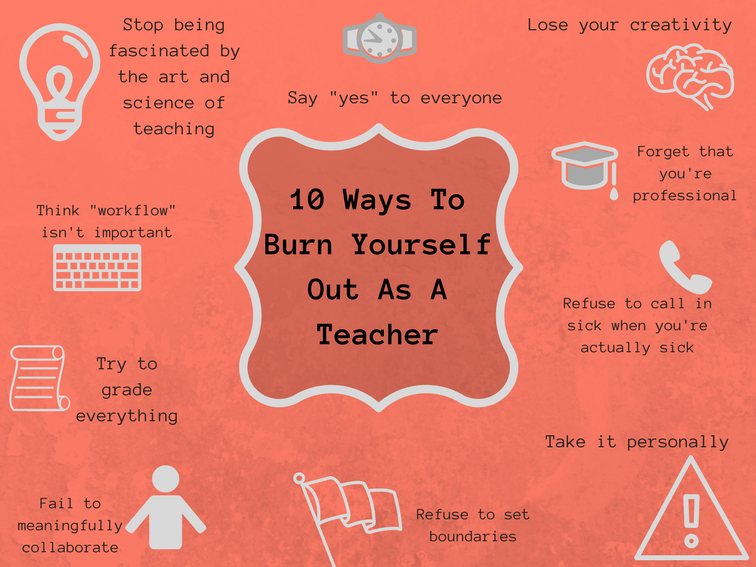
What Does It Look Like When You Burn Yourself Out As A Teacher?
by Terry Heick
Several years ago, we published a post titled, Why Good Teachers Quit.
Tens of thousands of social shared and scores of comments–later, it’s pretty clear that this idea resonates with teachers.
We’ve taken a few different approaches to the idea in the past, including 25 Ways To Reduce Teacher Burnout & Secrets For Teacher Survival, as well as The Best Teachers Don’t Do What They’re Told, as well as a recent post about “teaching differently.”
So here we are again, taking another look at teacher burnout, this time trying to understand how it happens. If you’re increasingly tired, prone to the Sunday night blues, and have had your July’s excitement increasingly replaced by a sense of dread, teacher burnout could be the reason why.
How To Burn Yourself Out As A Teacher: 10 Ways
1. Stop being fascinated with the art and science of teaching.
Teaching is a wonderful mix of curiosity, content, and process–ideas and data; love and numbers; soft and hard. Once you’ve lost your fascination here–with what works, how it work’s why it works, and what else might be possible, you turn into something less–a teacher just trying to survive each day.
And that inspires no one, and won’t tantalize the inner you, which leads to deeper mediocrity, and so on in a downward kind of spiral, until you’re that teacher in staff meetings just wanting to be told what to do while you count down the days until summer.
2. Lose your creativity.
Your creativity is your spark. It’s both a cause and an effect; a cause of exceptional learning design, and the effect of your own professional engagement with compelling content, and students you believe you can reach. As with #1 above, once you stop treating your classroom as playful and human and fun, so will your students.
3. Think “workflow” isn’t important.
How do you assign work? Collect it? What do you do–exactly–the moment it’s collected? Is it physical or digital? How do you separate grading and learning feedback? How do you collect data? How are your units and lessons designed to incorporate data?
The workflow of the modern teacher is everything.
4. Forget that you’re a professional.
Teaching is a deeply human process. It’s also one of the most humbling “jobs” you can do. In the end, you’re educated, trained, certified, and dedicated. You’re a professional. And it’s easy to forget this in the face of so much pressure and accountability and paperwork and CYA and, well, you probably already know.
5. Try to grade everything.
Don’t. Distinguish between practice and “measurements,” learning feedback and points so that both students and parents understand.
6. Refuse to set boundaries.
Between school and home. Between this class and that. Between last year and this year. Between healthy skepticism and negativity.
In fact, “get good” at unplugging altogether–and that doesn’t simply mean to put down your phone or tablet. It means to mentally unplug. Let go. Do something selfish every now and then. Be lazy. Flirt with life. Giggle.
It’s okay to set boundaries; you’re not good to anyone worn out, deflated, uninspired, and running on lethal levels of Diet Coke.
7. Take it personally.
It’s natural to take something as important as teaching personally. After all, it’s probably why you chose teaching to begin with. But i t’s also a recipe to wear yourself out. Trust yourself. Remind yourself that you’re a professional. You work exceptionally hard to better understand your craft, and how to design powerful learning experiences for students.
There will be times where you won’t be on. You’ll mess up. Something won’t work. You’ll feel lost. Worrying will just drain you, and paralyze your ability to think like the professional you are.
There is absolutely ego in teaching, no matter how selfless and noble a profession it seems. You’re acting as a content expert to lead students to life-changing knowledge and understanding. There’s real hubris–and hope–in that. But you can’t take it personally. I mean, you can, and at times this will pull you through, but it’s a dangerous game.
There is a thin line between believing in your work, and taking it all personally.
8. Fail to meaningfully collaborate.
This includes asking for help when you need it. Humble yourself. Reach out, connect, and try something new.
9. Say “yes” to everyone.
Join every committee, extra-curricular program, or planning event you’re asked to join. Submit to peer pressure and get roped into things until you’re completely over your head. That’ll wear you out in a hurry.
10. Refuse to call in sick when you’re sick.
Yes, it probably is just easier to come to school when you’re sick. Sub plans, behavior issues, learning continuity, etc. Listen to your body. If you’re sick, rest. Plus, nobody else wants that mess.
How To Burn Yourself Out As A Teacher; Signs of Teacher Burnout; image attribution flickr user Boudewijn Berends
